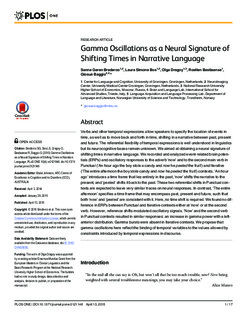Gamma oscillations as a neural signature of shifting times in narrative language
Journal article, Peer reviewed
Permanent lenke
http://hdl.handle.net/11250/283844Utgivelsesdato
2015-04-13Metadata
Vis full innførselSamlinger
Sammendrag
Verbs and other temporal expressions allow speakers to specify the location of events in
time, as well as to move back and forth in time, shifting in a narrative between past, present
and future. The referential flexibility of temporal expressions is well understood in linguistics
but its neurocognitive bases remain unknown. We aimed at obtaining a neural signature of
shifting times in narrative language. We recorded and analyzed event-related brain potentials (ERPs) and oscillatory responses to the adverb ‘now’ and to the second main verb in
Punctual (‘An hour ago the boy stole a candy and now he peeled the fruit’) and Iterative
(‘The entire afternoon the boy stole candy and now he peeled the fruit’) contexts. ‘An hour
ago’ introduces a time frame that lies entirely in the past, ‘now’ shifts the narrative to the
present, and ‘peeled’ shifts it back to the past. These two referential shifts in Punctual contexts are expected to leave very similar traces on neural responses. In contrast, ‘The entire
afternoon’ specifies a time frame that may encompass past, present and future, such that
both ‘now’ and ‘peeled’ are consistent with it. Here, no time shift is required. We found no difference in ERPs between Punctual and Iterative contexts either at ‘now’ or at the second
verb. However, reference shifts modulated oscillatory signals. ‘Now’ and the second verb
in Punctual contexts resulted in similar responses: an increase in gamma power with a leftanterior distribution. Gamma bursts were absent in Iterative contexts. We propose that
gamma oscillations here reflect the binding of temporal variables to the values allowed by
constraints introduced by temporal expressions in discourse.
